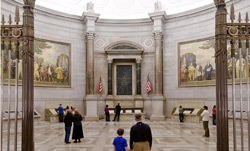The following press release from the National Archives deals with hours that many of the public exhibits are available to the public. Note that nothing is said about the access to original documents or the microfilm reading room.
Washington, DC: The National Archives Experience extended Spring and Summer hours will go into effect beginning on Tuesday, March 15, 2011. The  museum, located on the National Mall on Constitution Avenue and 9th Street, NW, will be open to the public from 10 a.m. until 7 p.m. seven days a week through Labor Day. Admission is free. The museum is open every day except Thanksgiving Day and December 25. Last admission is 30 minutes prior to closing.
museum, located on the National Mall on Constitution Avenue and 9th Street, NW, will be open to the public from 10 a.m. until 7 p.m. seven days a week through Labor Day. Admission is free. The museum is open every day except Thanksgiving Day and December 25. Last admission is 30 minutes prior to closing.
Rotunda for the Charters of Freedom — On permanent display are the Charters of Freedom – the original Declaration of Independence, Constitution and Bill of Rights.
The Charters of Freedom: Our Nation’s Founding Documents — Surrounding the Rotunda’s centerpiece cases, this exhibit takes a fresh look at the Declaration of Independence, the Constitution, and the Bill of Rights and uses facsimiles of historical documents from the holdings of the National Archives to answer two key questions about each Charter –“How did it happen?” and “Why is it important?” The new exhibit is an attempt to answer questions visitors often ask when see the Charters.
The Public Vaults — This interactive permanent exhibition creates the feeling of going into stacks and vaults of the National Archives. See the raw material from which history is made. From Washington’s letters, Lincoln’s telegrams, and FDR’s fireside chats to UFO reports and declassified secrets of World War II, these documents chronicle both great national events and the lives of individual Americans.
What’s Cooking, Uncle Sam? The Government’s Effect on the American Diet — Opens in the Lawrence F. O’Brien Gallery on Friday, June 10, 2011. Unearth the stories and personalities behind the increasingly complex programs and legislation that affect what we eat. Learn about Federal government’s extraordinary efforts, successes, and failures to change our eating habits. From Revolutionary War rations to cold war cultural exchanges, discover the multiple ways that food has occupied the hearts and minds of Americans and their government.
William G. McGowan Theater — By day, 290-seat William G. McGowan Theater continuously shows a short signature film about the National Archives and twice daily shows a film about the Charters of Freedom. By night, the McGowan Theater becomes the Capital region’s most important outlet for documentary film as well as a forum for exploring the great issues of American history and other topics related to the National Archives’ holdings and mission.
Museum Shop — After visitors have seen our nation’s most treasured documents in the Rotunda for the Charters of Freedom, there’s another important stop to make before they leave. Visitors can take home some treasures of their own. The Museum Shop offers wonderful gifts including: exclusive handmade jewelry depicting architectural elements of the National Archives Building and images of fragments of the Charters of Freedom; uniquely designed pottery, which is based on the fraktur family trees in the Archives’ holdings; anything one might need to record and preserve memories of the important moments in life, including photo albums, archival storage boxes, and more!
From the National Archives Press Release of March 3, 2011.
The press release does not specifically mention access to the microfilm research room or access to original records.
However, it does specifically state that the extended hours apply to the National Archives Experience museum, and specifically notes the exhibits contained within this museum.
The Museum entrance is a few blocks away from the Research entrance. The extended hours apply only the Museum, not to the Research areas of the Archives. There are no research areas accessible from the Museum entrance.